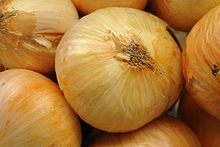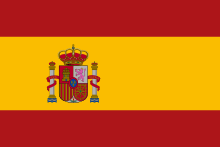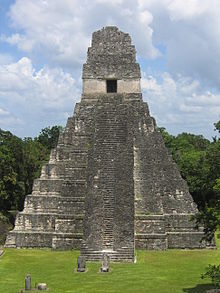Spanish (Ybit)
 From Wikiversity - Reading time: 4 min
From Wikiversity - Reading time: 4 min
This is a personal learning page for user Ybit and other who help him to understand and talk Spanish as a second language.
1st lesson[edit | edit source]
- What we did?
- we get acquainted
- have realised that you allready know a lot
- realised that printed book is not equal to on-line book --> so we will continue with on-line version
- studied about verbs and their declension:
- all verbs ends on -r; reflexive verb ends on -rse = thats infinitive
- there are 3 paradigms for declension according the verb ending: -ar (e.g. hablar), -er (e.g. comer) and -ir (e.g. vivir):
- HABLAR - present tense
- hablo
- hablas
- habla
- hablamos
- habláis
- hablan
--> than you see habl is a root and you just change terminations
- COMER - present tense
- como
- comes
- come
- comemos
- coméis
- comen
- VIVIR - present tense
- vivo
- vives
- vive
- vivimos
- vivís
- viven
--> for a good declension there is also a need to remember personal pronouns: yo; tú; él, ella, Vd.; nosotros; vosotros; ellos, ellas, Vds.
- And how about reflexive verbs? Well, they are the same declension according paradigms, you just have to know how to change reflexive particle
- LLAMARSE = LLAM-AR-SE - in the present tense is regular, so ti goes according HABLAR
- me llamo
- te llamas
- se llama
- nos llamamos
- os llamáis
- se llaman
- And how about reflexive verbs? Well, they are the same declension according paradigms, you just have to know how to change reflexive particle
- we also spoke about the difference between r and rr, when rr has a tractor pronunciation
- about the alphabet
- started the first lesson on wikibooks
- Homework
- study 3 examples of regular verbs and reflexive verbs
- find here and listen to CNN Plus: http://webteleradio.com/regiontv/spain.htm
- memorise Spanish alphabet
- write down a few sounds wich are simillar to rr pronunciation
- Next lesson?
- we will start with the test and review your homework
- we will talk
- we will finish the first lesson according and on-line textbook
Comments[edit | edit source]
2nd lesson[edit | edit source]
Dictate[edit | edit source]





- ahora
- trabajo
- yo
- umedo - húmedo
- note: humidity
- un doras - Honduras
- hola
- yamarce - llamarse
- remember:
- me llamo
- te llamas
- se llama
- nos llamamos
- os llamáis
- se llaman
- remember:
- ?karrar - querer
- ?ike - Quique
- pero
- perro --> más sobre la pronunciación de la r
- ?seboya - cebolla
- in Czech language: cibule
- colombia - Colombia
- caracas - Caracas
- ?kisana - gitana --> más sobre el flamenco --> y más sobre Andalucía
- ?ikon - Gijón
- madrid - Madrid
- barcelona - Barcelona
- ?caspeyano - castellano --> más sobre el castellano
- ?saudi - Cádiz --> más sobre Andalucía
- czecko - checo
- ?supar - chupar
- ?bida - vida
- hache - ache
- remember:
- Spanish alphabet recording needed!
- remember:
- ocho
- ?chupabida - chupavida
- emane - Giménez
- darcia - García
- ahora
- juan - Juan
- jose - José
- ajul - azul
- no se - no sé
- sabia - Sevilla --> más sobre Andalucía
- ?bilbao - Bilbao
- coledo - Toledo

- ninyo - niño
- anyo - año
- españa - España
- ?callego - gallego --> más sobre Galicia
- ?gallego
- ?itzel - Quetzal
- is: Quetzacoatl
- ?thickal - Tikal
- ke - que
- ?nalles - Yañéz
- ?cardes - Cádiz
- supapria - zapatería
-
Subcomandante Marcos, el jefe de los…
-
…zapatistas (EZLN – Ejército Zapatista de Liberación Nacional)
-
Los zapatistas tienen el nombre después de Emiliano Zapata
-
y nosotros sabemos que los zapatos en inglés son_______
- mexíco - México

- ? - Oaxaca
- ishta wokstu? - Ixtacíhuatl --> why I wrote this word bad
- exacto
--ybit 18:22, 21 September 2008 (UTC)
corrected by--Juan 18:32, 21 September 2008 (UTC)
--extended byJuan 07:47, 22 September 2008 (UTC)

Decline[edit | edit source]
hablar, comer, vivir, llamarse, escribir = 4 min
- hablar (tú) - hablas

- comer (nosotros) - comemos

- llamarse (ellos, ellas) - ? - se llama
- hablar (yo) - hablo

- escribir (Pedro) - escriba - escribe
- escribir (Vds.) - ? - escriben
- hablar (vosostros) - hablais - habláis
- llamarse (vosotros) - llama - os llamáis
- llamar (vosotros) - ? - llamáis
- llorar (yo) - ? - lloro
- comer (nosotros) - comemos

- vivir (tú) - vives

- hablar (él, ella) - habla

- trabajar (nosotros) - trabajamos

- vivir (vosotros) - vivimos - vivís
- trabajar (él, ella) - trabaja

- llorar (nosotros) - lloramos

- trabajar (yo) - trabajo

- comer (yo) - como

- vivir (yo) - vivo

- vivir (tú) - vives

- trabajar (ellos, ellas) - trabajan

- llamarse (tu) - - te llamas
- llamar (tu) - llamas

- presentar (él, ella, Vd.) - presenta

- presentar (yo) - presento

- comer (yo) - como

- presentar (Vds.) - ? - presentan
- trabajar (vosotros) - trabajamos - trabajáis
- hablar (Vds.) - ? - hablan
Correction: 12![]() /30 entries = you should study more--Juan 08:48, 22 September 2008 (UTC)
/30 entries = you should study more--Juan 08:48, 22 September 2008 (UTC)
What we did?[edit | edit source]
- dictate
- discovered the hispanic culture
- conjugated
- discovered raw food
Homework[edit | edit source]
- go to Spanish (Ybit)#Dictate and add information missing
- have a look at: Spanish (Ybit)#Decline and study present tense within regular verbs for the next lesson
Next lesson?[edit | edit source]
- we will repate this lesson
- we will do lessons 1-3(4) from wikitextbokk
Lessons[edit | edit source]
Licensed under CC BY-SA 3.0 | Source: https://en.wikiversity.org/wiki/Spanish_(Ybit)101 views | Status: cached on March 14 2023 18:38:40↧ Download this article as ZWI file
 KSF
KSF


